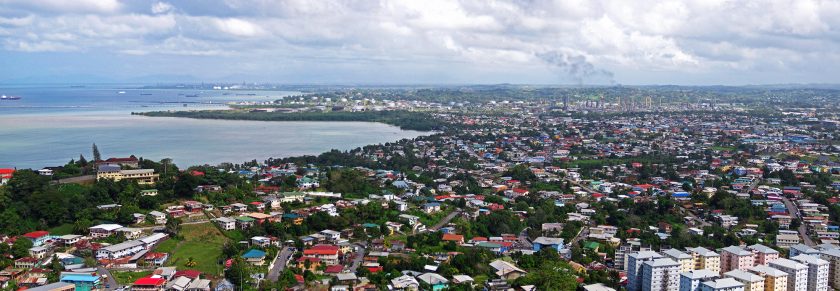Partnership Seeks to Fight Climate Change and Boost Caribbean Nation’s Economy
May 6, 2019

The University of Texas at Austin is partnering with two Caribbean universities on the dual-island nation of Trinidad and Tobago to create a new clean industry that will store greenhouse gasses underground and eliminate the country’s contribution to human-induced climate change.
The nation has strong incentives to mitigate climate change. Surrounded by the warm Caribbean Sea, the small Delaware-sized country is susceptible to sea level rise and tropical storms, both of which are expected to increase in intensity as the world warms. In addition, although the oil and gas industry accounts for 40% of gross domestic product and 80% of exports, it has been declining in recent years, prompting interest in developing a new carbon storage industry to provide a source of jobs. And although the tiny country emits a relatively small amount of greenhouse gasses compared with large nations, it is in the top 10 highest in per capita emissions globally due to its industrialized economy.
“For us, we’ve been declining in [oil and gas] production so rapidly that something needs to be done quickly to protect our economy,” said David Alexander, a petroleum researcher at The University of Trinidad and Tobago. “Someone else may perceive this as a problem, but really it’s not — it’s an opportunity to create more jobs and wealth while implementing sustainability measures that address our emissions.”
UT is partnering with The University of Trinidad and Tobago and The University of the West Indies on the new effort.
“I’m enthusiastic about the start of what I hope will be a long and fruitful partnership,” said Katherine Romanak, a research scientist with the UT Bureau of Economic Geology’s Gulf Coast Carbon Center. “By setting a precedent for what’s possible in an international collaboration on climate change mitigation, we hope others will be inspired to follow our footsteps.”
Carbon capture and geologic storage (CCS) is a method of capturing greenhouse gasses from industrial facilities and storing them underground so they are not released into the atmosphere where they can contribute to human-caused climate change. In February and April, the universities signed two memoranda of understanding that laid out plans for organizing scientific meetings and workshops and sharing facilities, with the goal of deploying CCS technology in Trinidad and Tobago.
The three universities have been working on the collaboration since 2017. However, Romanak and Andrew Jupiter of The University of the West Indies Petroleum Studies Unit fast-tracked the agreement in December 2018 during the 24th Conference of the Parties to the United Nations Framework Convention on Climate Change. Both researchers took part in a panel discussion at the conference. The panel was the only official conference event dedicated to CCS.
Other alternatives to CCS, such as storing carbon in forests or the soil, may seem like attractive mitigation options, but many experts believe that CCS has the potential to make the biggest impact on the country’s emissions. That’s because storing carbon in forests or using renewable energy options such as solar and wind currently require large amounts of land that the small island nation doesn’t have.
“Even if the whole island was trees, no houses, it wouldn’t be enough,” Jupiter said during the panel.
The nation’s representatives are looking at a portfolio of mitigation options, but implementing CCS is likely to have the biggest effect on the nation’s emissions, Jupiter said.
To demonstrate the role of the technology, Jupiter and Alexander have recommended that CCS be included in the nation’s “technology needs assessment” document, which outlines the nationwide strategy to mitigate emissions. With this document, the nation can access critical international funding, such as the Green Climate Fund that is aimed at their specific needs.
The researchers are also exploring the idea of holding their first CCS workshop for local stakeholders at one of the Trinidad universities in September.
“Now that we have this formal partnership started and we’re making progress at the political level on our nation’s plan to tackle climate change impacts, we have no doubt in our mind that Trinidad and Tobago will be a country that sets a precedent,” Jupiter said. “For other Caribbean nations that have yet to act, here’s a way forward.”
The Bureau of Economic Geology is a unit of the UT Jackson School of Geosciences.
For more information, contact: Anton Caputo, Jackson School of Geosciences, 512-232-9623; Monica Kortsha, Jackson School of Geosciences, 512-471-2241
